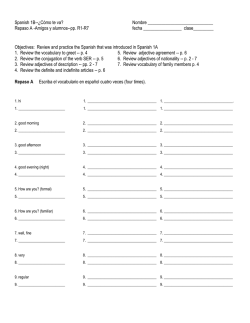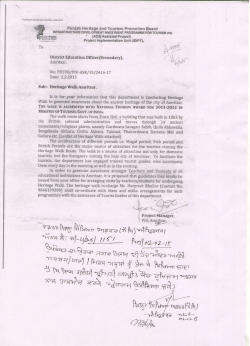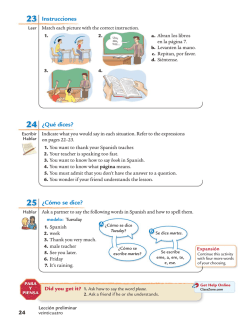
Department of Romance Languages, Spanish Heritage Language
Department of Romance Languages, Spanish Heritage Language Program, University of Oregon February 18th-20th, 2016 Febrero de 2016 Estimados colegas, Con gran entusiasmo les damos la bienvenida al tercer simposio de español como lengua de herencia que organiza la Universidad de Oregón. Esta será la primera vez que este simposio no se organiza en Texas Tech University, en Lubbock. Sin embargo, seguimos con el mismo perfil de los dos primeros simposios en Texas para darle continuidad al novedoso foro de discusión que se ha abierto en el campo de estudio del español en los Estados Unidos. En el simposio que hemos organizado este año en Eugene, Oregón ustedes contarán con la presencia de numerosos investigadores, pedagogos y estudiantes graduados que presentarán los avances teóricos y prácticos en diferentes aspectos de este campo de estudio. También contarán con la oportunidad de asistir a tres talleres con muy diversos enfoques, los cuales incluyen i) los retos que existen para ubicar a los estudiantes en los cursos para hablantes de español como lengua de herencia en la escuela preparatoria; ii) diferentes técnicas para crear cursos con elementos de servicio en la comunidad; iii) y la integración de la tecnología en los cursos de español para hablantes de herencia. Este año hemos incorporado también, a petición de varios participantes del simposio pasado, una nueva tradición. En el mes de octubre de 2015, como parte de la celebración del mes de la hispanidad, organizamos el primer concurso nacional del espanglés o spanglish. De este modo, contaremos con la entrega de premios a diversos estudiantes de todo el país. Asimismo, el tercer simposio sigue con los objetivos y el espíritu original de los dos anteriores y nos alegramos de sobremanera al comunicarles que el próximo año tendrá lugar en la Universidad de California en Irvine. Reciban un caluroso saludo, y esperamos que su estancia en la Universidad de Oregón y en Eugene sea de su agrado. Claudia Holguín Mendoza, Ph.D. Directora del programa de español como herencia Chair of 3rd Symposium on Spanish as a Heritage Language Acknowledgements This event would not have been possible without the support and involvement of many people and organizations. First, we are grateful to all the staff, graduate students and faculty from the Department of Romance Languages who supported who helped make this happen in too many ways to mention over the past 8 months: Assistant Organizer of the 3rd SSHL Heather Quarles, Linda Leon, Zach Lazar, Alex Zunterstein, Sebastián Urioste, Macarena Tejeda, Kelley León Howarth, Nagore Sedano, Amy Costales, Luz Romero, Luz Hernández, Nathan Whalen, Brandon Rigby, Sayo Murcia, Rafael Arias, Katelyn Tassan, Doralba Pérez, Melinda Boettcher, Eva Serfoso, Jordan Clementi, Analisa Taylor, Robert L. Davis, Iñaki Gonzalo, Erin Moberg, Paolo Henríquez, Jeff Contreras, Carrie Reilly, Laurie de Gonzalez, Paula Ellister, Leah Middlebrook, Pedro García, Gloria Zabala, and Amalia Gladhart. We are also indebted to the colleagues who reviewed abstracts for the conference: Luz María Hernández, Sebastián Urioste , Sara Beaudrie, Rajiv Rao, Doralba Perez Ibañez, Eva Serfozo, Katelyn Tassan, Jordan Clementi, Damian Vergara Wilson, Munia Cabal Jimenez, Inmaculada Gomez Soler, Iñaki Gonzalo, María Ciriza-Lope, Florencia Henshaw, Julio Torres, Amalia Llombart-Huesca, Alez Zunterstein, Melinda Boettcher, Delia Magaña, Diego Pascual y Cabo, Mark Amengual, Jennifer Cabrelli Amaro, Josh De la Rosa-Prada, Robert Davis The 3rd Annual Symposium on Spanish as a Heritage Language is sponsored by the following units at the University of Oregon: the Department of Romance Languages, the Office of Academic Affairs, the Deans Office of the College of Arts and Sciences, the Center for Multicultural Academic Excellence, the College of Education, the Center for Latino and Latin American Studies, the Honors College, the Oregon Humanities Center’s Endowment for Public Outreach in the Arts, the Division of Undergraduate Studies, the Graduate School, the Latin American Studies Program, MEChA, and the Department of English . And, finally, the National SSHL Organizing Committee: Florencia Henshaw, Claudia Holguín, Julia Oliver-Raján, Diego Pascual y Cabo, Damián Vergara Wilson and Julio Torres Thursday, February 18th, 2016 4:30pm - 5:00pm 5:00pm - 6:30pm 6:30pm Friday, February 19th, 2016 8:00am - 8:45am 8:45am - 10:00am Bean East Conference Room Classroom Research and Assessment Chair: Doralba Pérez Ibañez 10:10am - 10:40am Overcoming Placement Challenges: New Opportunities for Spanish Language Heritage Learners. Marta Fairclough, University of Houston. Randal Barrette, Avant assessment. 10:45am - 11:15am Spanish oral language proficiency assessments and TWI heritage language learners: Multimodal language. Amy Young and Christina Karahisarlidis, New York University. 11:20am - 11:50am Surveying proficiency of Spanish heritage learners in a small liberal-arts college. Elena Aldea Agudo, Jessica Cox, Jialing Liu, and KathrinTheumer, Franklin and Marshall College. Ford Alumni Center - Lee Barlow Giustina Ballroom Registration OPENING REMARKS. Ford Alumni Ballroom. • Claudia Holguín Mendoza, Director of the SHL program at the University of Oregon. • Superintendent of School District 4j, Eugene, OR, Gustavo Balderas. A critical view of SHL: Speaking back to the neoliberal university Plenary Speaker 1: Jennifer Leeman. George Mason University. Welcome Reception Global Scholars Great Hall Light Breakfast & Late Arrival Registration Welcome • Claudia Holguín, Director SHL UO, Chair SSHL 2016 • Dr. Susan Rieke -Smith, Superintendent Springfield Public Schools Beyond Mexican Food: Latinos in Oregon and Implications for Heritage Language Teaching Plenary Speaker 2: Dr. Susana Rivera - Mills, OSU Moore Dining Room Bean West Conference Room Identities, Ideologies, and Language Choice Chair: Melinda Boettcher Formal Studies and Cognition Chair: Elizabeth Valdez Social Network Sites & Translanguaging (or Not). Linda Lemus, University of Arizona. La percepción de cognates a través del lenguaje y la cognición: Una exploración psicolingüística. David Beard, Miami University. Reframing New Mexican Spanish through Spanglish: Language Ideologies, Attitudes, and Lexical Choices in Mexican-Nuevomexicano Families. Lillian Gorman, University of Arizona. Heritage language learners’ knowledge of derivative word forms. Eve Zyzik, UC Santa Cruz. Family Letters: a Linguistic Analysis of the Personal Correspondence of a Mexican American Family. Isabel Velazquez and Kate Mendell, University of Nebraska, Lincoln. Metaknowledge and Metalinguistic Strategies in the Spanish for Heritage Learners Classroom: a Curriculum Redesign. Flavia Belpoliti, and Elisa Gironzetti, Texas A&M University Commerce. Friday, February 19th, 2016 12:00pm - 1:00pm Bean East Conference Room Lunch Break Workshop #1 Chair: Amy Costales 1:00pm - 1:30pm The problem with placement: dual immersion students and college Spanish. Amanda Filloy Sharp Gloria Kussalanant, Alicia Ward-Satey, Corvallis High School 1:35pm - 2:05pm 2:10pm - 2:40pm 2:40pm - 3:10pm Refreshment Break SHL and Portuguese Chair: Alex Zunterstein 3:10pm - 3:40pm Teaching Portuguese to Spanish Speakers in the High Schools. Eduardo Da Silva, University of Washington. 3:45pm - 4:15pm Teaching Portuguese to speakers of Spanish as L2 and as a Heritage Language. Simone Da Silva, University of Oregon. 4:20pm - 4:50pm Professional Development for Educators of Portuguese as a Heritage Language. Luciana Lessa Rodrigues, Georgia State University. Felícia Jennings-Winterle, Brasil em Mente. 5:30pm - 6:30pm 6:30pm - 8:00pm Moore Dining Room Bean West Conference Room Identities, Ideologies, and Attitudes Chair: Rafael Arias Anrango Formal Studies (1) Chair: Iñaki Gonzalo Actitudes y percepciones de los hablantes de herencia en el contexto de estudios en el extranjero. Munia Cabal Jiménez, Western Illinois University. Variable placement in heritage language. Anita Kemp, University of Oregon. Development of a self-report instrument to measure Spanish HS’ attitudes toward their heritage language. Jocelly Meiners and Delia Montesinos, University of Texas at Austin. Differentiated Teaching in the beginning-level SHL classroom: Examples using the Subjunctive. Stephanie Brock, and Andrea Herrera Dulcet, University of Arizona. Problematizing Spanish Heritage Language Identities: HL Speakers of Mexican Descent Studying Abroad. Rebecca Pozzi, and Lina Reznicek-Parrado, UC Davis. The Effects of Community and Complexity on HS’ Production of Subjunctive Forms. David Giancaspro, Rutgers University. Phonetics and Phonology Chair: Julio Torres Classroom Research and Service Learning Chair: Nagore Sedano The production of rhotics in Spanish: a comparison of native speakers and heritage speakers of differing proficiency levels. C. Elizabeth Goodin-Mayeda, University of Houston. Spanish heritage language learner attitudes: The benefits of community service-learning. Diego Pascual y Cabo, Josh De la Rosa Prada, Texas Tech University. Kelly Lowther Pereira, The University of North Carolina – Greensboro. Spanish heritage speakers’ phonological competence. Marisol Garrido, Eastern Michigan University. Communities and connections: Servicelearning for Spanish heritage speakers. Kelly Lowther Pereira, The University of North Carolina – Greensboro. Metalinguistic intuitions regarding syllabification in heritage and native speakers of Spanish. Michael Shelton, Occidental College. David Counselman, Ohio Wesleyan University. Nicolás Gutiérrez, Universidad de Jaén. Content & Consciousness Inside and Outside the Classroom: Advantages of Community-based Assignments. Kelley León-Howarth, University of Oregon. Global Scholars Great Hall Evening Reception First Annual National Celebration of Spanglish Day Creative Writing Contest Awards Guest Artist: Bill Santiago: Pardon My Spanglish Saturday, February 20th, 2016 Global Scholars Room 117 8:00am - 9:00am Workshop #2 Chair: Munia Cabal Jiménez 9:00am - 9:30am 9:35am - 10:05am Our learning curve for building a service learning course with Spanish heritage speakers María Ciriza-Lope Marco Shappeck Steven Arxer University of North Texas at Dallas 10:10am - 10:40am 10:40am - 10:55am Authentic Materials Chair: Luz Romero-Montaño 10:55am - 11:25am Las series televisivas como factor de motivación en hablantes hispanos de herencia en la Universidad en Nueva York. Lorena García Barroso, The Graduate Center, CUNY. 11:30am - 12:00am User- Generated Materials for Heritage Spanish Project: Locally produced, locally used. José Esteban Hernández, Mark Cisneros, Estela Hernández, Blanca Jaimes-Luna, Víctor Tijerina, University of Texas-Rio Grande Valley. Yanina Hernández, Texas State Technical College_Harlinge. 12:00pm - 1:00pm Workshop #3 Chair: Simone Da Silva 1:00pm - 1:30pm 1:35pm - 2:05pm 2:10pm - 2:40pm 2:45pm - 3:15pm Beyond ‘cool’: Integrating technology in the heritage language classroom. Florencia Henshaw University of Illinois at Urbana Champaign Global Scholars Room 130 Global Scholars Room 131 Light Breakfast Classroom Research and Writing Chair: Macarena Tejada-López Formal Studies (2) Chair: Diego Pascual y Cabo Orthography in the writing of Beginner Spanish Heritage Learners. Encarna Bermejo, Houston Baptist University. Flavia Belpoliti, Texas A&M University-Commerce. Development and validation of a placement instrument for Heritage Language Learners of Spanish. Evelyn Duran Urrea and Beatriz Lado, Lehman College, CUNY. Te lo pido por favor: El conocimiento de normas pragmáticas en las peticiones electrónicas entre hablantes de español como lengua heredada. Chelsea Escalante, UC Davis. Usos y Omisiones del artículo definido en sintagmas nominales en el español de hablantes de herencia. Rosalva Alamillo. University of Houston. Elliptical tener que: Evidence from Twitter corpora. Melissa Vega-Valdez, and Aaron Yamada, UC Davis. Explaining Heritage Spanish Transfer attrition or universal principles? Zuzanna Fuchs, Harvard University. Gregory Scontras, Stanford University. María Polinsky, University of Maryland. Coffee Break Contact and Linguistic Variation Chair: Josh Delarosa-Prada Classroom research Chair: Sebastián Urioste Chapines in Chicanolandia: Contact Amongst the Spanishes of Los Angeles. Ana Sánchez Muñoz, and Daisy González, California State University, Northridge. Exploring interaction between heritage and second language learners in the Spanish classroom. Ana Fernández Dobao, University of Washington. El español andino como lengua de herencia y el bilingüismo quechua-español en el Perú. Eunice Cortez, Lehigh University. The heritage language as a complex adaptive system: Practical applications of usage-based linguistic. Damián Vergara Wilson, University of New Mexico. Lunch Break Multiliteracies and Critical Pedagogies Chair: Licia Aldana SHL Program Challenges Chair: Jordan Clementi Teaching Acting in Spanish for Heritage Speakers (non-Actors). Olga Sanchez Saltveit, University of Oregon Theatre Arts. The History of the Longest-Running Program of Spanish as a Heritage Language in the United States. Carlos Enrique Ibarra and Karol IbarraZetter, University of New Mexico. What’s next?: Heritage language learners shape new paths in Spanish teaching. Julio Torres, UC Irvine. Diego Pascual y Cabo and John Beusterien, Texas Tech University. Spanish for Heritage Learners at Portland State. Robert Sanders and Elena Avilés, Portland State University. La clase de lingüística: un espacio para aprendizaje y autoempoderamiento como hablante de herencia. Luz María Hernández, University of Oregon. The road to be Taken: Becoming a Teacher of Spanish. Carmen Cáceda, Purdue University. Final Remarks Plenary Speakers Dr. Susana Rivera-Mills Dr. Susana Rivera-Mills serves as Vice Provost and Dean for Undergraduate Studies, and is Professor of Spanish Linguistics and Diversity Advancement at Oregon State University. She holds B.A and M.A degrees from University of Iowa and the Ph.D. from University of New Mexico. She has published several books and numerous articles on the topics of Spanish in the U.S., issues in sociolinguistics, second language acquisition, Latino ideology, and Spanish for heritage speakers. She has presented at national and international conferences where she shares her expertise in Spanish-speaking communities in contact with English, and issues surrounding U.S. Latino ethnic identity. Her talk is entitled “Beyond Mexican Food: Latinos in Oregon and Implications for Heritage Language Teaching”. It will take place in Global Scholars Great Hall, Friday February 19th at 9:oo am. Dr. Jennifer Leeman is Associate Professor of Spanish at George Mason University and Research Sociolinguist at the Center for Survey Measurement at the U.S. Census Bureau. Dr. Leeman’s research focuses on ideologies and representations of language, race and nation in the US; language policy in multilingual societies; and the sociopolitics of language education. In the area of heritage language education, her primary interests are critical pedagogical approaches and the interplay of identity and language. Her talk is entitled “A Critical View of Spanish as a Heritage Language: Speaking Back to the Neoliberal University”. It will take place in the Ford Alumni Ballroom, Thursday February 18th at 5:30 pm. Bill Santiago Bill Santiago is the first born of at least four children. He became a standup after narrowly escaping a career in journalism, facing the fact that as a comedian he was funny, but as a reporter he was a joke. It’s been said he was born to Puerto Rican immigrants, which is technically untrue, as Puerto Ricans are US citizens. Although, he’s got an uncle who was once deported to the Bronx. With the premiere of his first television special, “Comedy Central Presents: Bill Santiago,” he won over fans nationwide with his dead-on observations about Spanglish: “twice the vocabulary, half the grammar!” and his beloved catchphrase “¡Porque Because!” Which led to his first book, Pardon My Spanglish. The book is now being used at universities and high schools across the country to stimulate discussions about identity, language and multiculturalism. Santiago’s second half-hour special appeared on Showtime. Recently, he appeared Saturday mornings on CNN, delivering comic relief commentary via “Santiago’s Weekly Pop Wrapup.” His Sirius XM Radio Show, “Total BS,” is now be relaunched as a podcast. Workshops The Problem With Placement: Dual Immersion Students And College Spanish Courses Presented by Amanda Filloy Sharp, Gloria Kussalanant, Alicia Ward-Satey, Corvallis High School A collaborative discussion on how colleges and universities identify and serve SpanishEnglish bilingual undergraduates from Dual Language Immersion programs. This population is increasing rapidly, and the students often don't fit the typical profile for university-going heritage speakers. Conversation will focus on the skill set DLI graduates bring to college, how colleges currently do and do not serve them, and how secondary and post-secondary educators can work towards alignment and mutual support during the current boom of DLI programs. Our Learning Curve For Building A Service Learning Course With Spanish Heritage Speakers Presented by María del Puy Ciriza-Lope, Marco Shappeck, Steven Arxer, University of North Texas, Dallas When institutions of higher education practice community service, their involvement can quickly follow older patterns of paternalism (that is, members of an institution filled with upwardly mobile youth reach out to a marginalized class as a gesture of inclusiveness, despite the lack of any measurable change for the “served” community). This workshop will present a service learning project that would seem to have side-stepped this model: the teachers of the adult ESL program, Spanish heritage speakers from the university, are from the same neighborhood as the adult English learners they teach and both groups share overlapping socio-cultural practices. The workshop will discuss the origins and personal and institutional successes of the program, and examine how notions of Hispanic and Latino identity operate at interpersonal and local levels. In the interactive portion, participants and presenters will articulate approaches that encourage reciprocal relationship building for collaborative projects that develop trust and continuity. Beyond ‘Cool’: Integrating Technology In The Heritage Language Classroom Presented by Florencia G. Henshaw, University of Illinois at Urbana-Champaign Considering that one of the main advantages of computer-assisted language learning is that it allows for more individualized instruction and personalized learning, it is surprising that the use of technology in HL teaching has remained largely unexplored. This is likely due to the scarcity of publisher-provided online materials that meet the needs of HL learners. Educators are then left to their own devices to integrate technology in the curriculum. Given the vast number of technological tools available, how do educators go about the daunting task of selecting the best ones? And, how can technology be integrated in a way that it truly enhances HL learning? This workshop will discuss the advantages and disadvantages of technology use with HL learners, based on research to date. We will then explore the most useful tools for the HL classroom with practical ideas to show how HL teaching and learning may be enriched with the sound use of technology. Preented by: • MEChA • Clark Honors College • Graduate School • Division of Undergraduate Studies • • Department of English • Center for Latino/a and Latin American Studies • • The Oregon Humanities Center’s Endowment for Public Outreach in the Arts • • Latin American Studies Program •
© Copyright 2026


